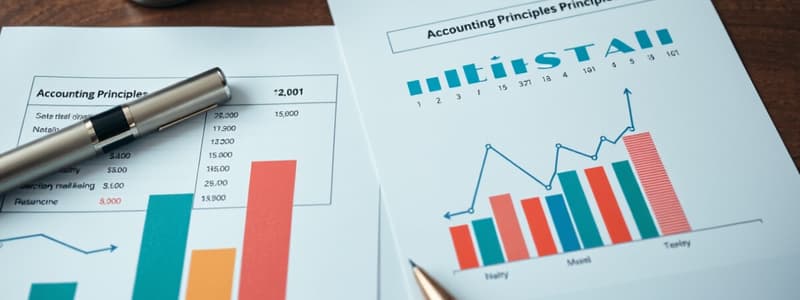Podcast
Questions and Answers
What is the primary aim of accounting?
What is the primary aim of accounting?
- To provide useful information for decision-making (correct)
- To investigate fraud
- To manage cash flow
- To prepare tax returns
Internal users of accounting information include government and regulatory bodies.
Internal users of accounting information include government and regulatory bodies.
False (B)
Name one role of accounting information in business planning.
Name one role of accounting information in business planning.
Determining advertising expenditure
Accounting is an information system that identifies, records, and communicates ______ events of an entity.
Accounting is an information system that identifies, records, and communicates ______ events of an entity.
Match the following users of accounting with their categories:
Match the following users of accounting with their categories:
Which of the following is considered a characteristic of financial accounting?
Which of the following is considered a characteristic of financial accounting?
Digital disruption only affects traditional businesses, not the accounting field.
Digital disruption only affects traditional businesses, not the accounting field.
Who are some internal users of accounting information?
Who are some internal users of accounting information?
Digital disruption involves new technologies and business models that impact, transform, or ______ existing goods and services.
Digital disruption involves new technologies and business models that impact, transform, or ______ existing goods and services.
Which of the following is NOT an external user of accounting information?
Which of the following is NOT an external user of accounting information?
Which statement defines Owner’s Equity in a balance sheet?
Which statement defines Owner’s Equity in a balance sheet?
The Statement of Profit or Loss measures the financial performance over a period of time.
The Statement of Profit or Loss measures the financial performance over a period of time.
What is the formula for calculating Owner's Equity?
What is the formula for calculating Owner's Equity?
The _____ statement measures cash receipts and cash payments over a period of time.
The _____ statement measures cash receipts and cash payments over a period of time.
Match the financial statement with its primary focus:
Match the financial statement with its primary focus:
Which of the following is NOT a category of cash transactions in the Statement of Cash Flows?
Which of the following is NOT a category of cash transactions in the Statement of Cash Flows?
A loss occurs if revenues are greater than expenses.
A loss occurs if revenues are greater than expenses.
What does the Statement of Changes in Equity summarize?
What does the Statement of Changes in Equity summarize?
In the balance sheet, liabilities refer to present ________ of the entity.
In the balance sheet, liabilities refer to present ________ of the entity.
Which financial statement details the net effect of income and expenses?
Which financial statement details the net effect of income and expenses?
Which of the following is an external user of accounting information?
Which of the following is an external user of accounting information?
Financial accounting focuses mainly on the needs of internal users.
Financial accounting focuses mainly on the needs of internal users.
Name one primary role of accounting information in business planning.
Name one primary role of accounting information in business planning.
Accounting provides information that helps users make ______ decisions.
Accounting provides information that helps users make ______ decisions.
What is a main characteristic of management accounting?
What is a main characteristic of management accounting?
Match the following users of accounting to their roles:
Match the following users of accounting to their roles:
Digital disruption has no significant impact on the accounting industry.
Digital disruption has no significant impact on the accounting industry.
How does accounting information play a role in debt vs equity decisions?
How does accounting information play a role in debt vs equity decisions?
Digital disruption refers to new technologies that ______ existing goods and services.
Digital disruption refers to new technologies that ______ existing goods and services.
Which of the following tools is commonly applied in preparing financial reports for business use?
Which of the following tools is commonly applied in preparing financial reports for business use?
Which statement is true regarding the Statement of Financial Position?
Which statement is true regarding the Statement of Financial Position?
Owner's equity is calculated as the sum of assets and liabilities.
Owner's equity is calculated as the sum of assets and liabilities.
What does the Statement of Profit or Loss measure?
What does the Statement of Profit or Loss measure?
The difference between revenues earned and expenses incurred is referred to as ______.
The difference between revenues earned and expenses incurred is referred to as ______.
Match the financial statements with their primary focus:
Match the financial statements with their primary focus:
Which of the following best describes the Statement of Cash Flows?
Which of the following best describes the Statement of Cash Flows?
An increase in capital contributions will decrease owner's equity.
An increase in capital contributions will decrease owner's equity.
What is a loss in the context of revenues and expenses?
What is a loss in the context of revenues and expenses?
In financial statements, a cash outflow is indicated by putting ______ around the amount.
In financial statements, a cash outflow is indicated by putting ______ around the amount.
Which financial statement would you refer to in order to see how much cash the business spent on equipment?
Which financial statement would you refer to in order to see how much cash the business spent on equipment?
Flashcards are hidden until you start studying
Study Notes
What is Accounting?
- An information system that identifies, records, and communicates economic events of an entity.
- Aids users in making informed decisions by providing relevant financial information.
The ‘Why’ of Accounting
- Aims to provide useful information for decision-making.
- Facilitates sound financial strategies and planning.
Users of Accounting
- Internal Users: Includes CEOs, Marketing Managers, Production Supervisors, and CFOs.
- External Users: Comprises Investors (Shareholders), Creditors/Lenders (Suppliers and Banks), and Government regulatory bodies (ATO, ASIC).
Differences between Financial Accounting and Management Accounting
- Financial accounting focuses on reporting financial performance to external stakeholders.
- Management accounting serves internal decision-making needs, providing detailed financial insights.
Role of Accounting Information in Business Planning
- Essential for all aspects of a business plan, influencing decisions in marketing, operations, and finance.
- Guides advertising expenditure, procurement of raw materials, and financing strategies (debt vs equity).
Digital Disruption in Accounting
- Defined as innovations that transform existing goods, services, and business activities.
- Key technologies include Big Data, Data Analytics, AI (Machine Learning), Cloud Computing, Fintech, and Blockchain.
Business Sustainability
- Involves managing resources responsibly for future generations.
- Requires accounting for:
- All resources used (labor, materials, energy, etc.)
- Outputs produced (products/services, carbon emissions, waste).
- Economic loss occurs when resources consumed exceed outputs produced.
Introduction to Financial Statements
- Four main financial statements:
- Statement of Financial Position (Balance Sheet)
- Statement of Profit or Loss (Income Statement)
- Statement of Cash Flows
- Statement of Changes in Equity
Statement of Financial Position (Balance Sheet)
- Displays the financial position at a specific point in time.
- Assets: Economic resources controlled by the entity.
- Liabilities: Present obligations of the entity from past transactions.
- Owner’s Equity (OE): Owner’s residual interest; calculated as OE = A - L.
Statement of Profit or Loss (Income Statement)
- Reflects financial performance over a specified period.
- Details changes in income (revenues) and expenses to determine net profit or loss.
- Profit realized when revenues exceed expenses (R > E).
Statement of Cash Flows
- Measures cash inflows and outflows over a period.
- Categorizes cash transactions into:
- Operating activities: Daily business operations.
- Investing activities: Acquisition/disposal of non-current assets.
- Financing activities: Changes in the financial structure of the business.
Statement of Changes in Equity
- Summarizes changes in the entity's worth over a defined period.
- Includes factors like capital contributions, profits/losses, and drawings/dividends.
- Indicates whether the organization increased or decreased its overall worth.
General Notes on Financial Statements
- Cash outflows are denoted with brackets to indicate negative changes in equity.
What is Accounting?
- An information system that identifies, records, and communicates economic events of an entity.
- Aids users in making informed decisions by providing relevant financial information.
The ‘Why’ of Accounting
- Aims to provide useful information for decision-making.
- Facilitates sound financial strategies and planning.
Users of Accounting
- Internal Users: Includes CEOs, Marketing Managers, Production Supervisors, and CFOs.
- External Users: Comprises Investors (Shareholders), Creditors/Lenders (Suppliers and Banks), and Government regulatory bodies (ATO, ASIC).
Differences between Financial Accounting and Management Accounting
- Financial accounting focuses on reporting financial performance to external stakeholders.
- Management accounting serves internal decision-making needs, providing detailed financial insights.
Role of Accounting Information in Business Planning
- Essential for all aspects of a business plan, influencing decisions in marketing, operations, and finance.
- Guides advertising expenditure, procurement of raw materials, and financing strategies (debt vs equity).
Digital Disruption in Accounting
- Defined as innovations that transform existing goods, services, and business activities.
- Key technologies include Big Data, Data Analytics, AI (Machine Learning), Cloud Computing, Fintech, and Blockchain.
Business Sustainability
- Involves managing resources responsibly for future generations.
- Requires accounting for:
- All resources used (labor, materials, energy, etc.)
- Outputs produced (products/services, carbon emissions, waste).
- Economic loss occurs when resources consumed exceed outputs produced.
Introduction to Financial Statements
- Four main financial statements:
- Statement of Financial Position (Balance Sheet)
- Statement of Profit or Loss (Income Statement)
- Statement of Cash Flows
- Statement of Changes in Equity
Statement of Financial Position (Balance Sheet)
- Displays the financial position at a specific point in time.
- Assets: Economic resources controlled by the entity.
- Liabilities: Present obligations of the entity from past transactions.
- Owner’s Equity (OE): Owner’s residual interest; calculated as OE = A - L.
Statement of Profit or Loss (Income Statement)
- Reflects financial performance over a specified period.
- Details changes in income (revenues) and expenses to determine net profit or loss.
- Profit realized when revenues exceed expenses (R > E).
Statement of Cash Flows
- Measures cash inflows and outflows over a period.
- Categorizes cash transactions into:
- Operating activities: Daily business operations.
- Investing activities: Acquisition/disposal of non-current assets.
- Financing activities: Changes in the financial structure of the business.
Statement of Changes in Equity
- Summarizes changes in the entity's worth over a defined period.
- Includes factors like capital contributions, profits/losses, and drawings/dividends.
- Indicates whether the organization increased or decreased its overall worth.
General Notes on Financial Statements
- Cash outflows are denoted with brackets to indicate negative changes in equity.
Studying That Suits You
Use AI to generate personalized quizzes and flashcards to suit your learning preferences.




